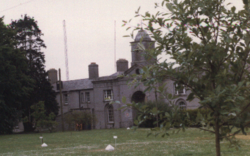
Summary
Devoy Barracks (Irish: Dún Uí Dhubhuí) was a military installation in Naas, County Kildare in Ireland.
| Devoy Barracks | |
|---|---|
Dún Uí Dhubhuí | |
| Naas, County Kildare | |
 The archway at Devoy Barracks | |
 Devoy Barracks Location within Ireland | |
| Coordinates | 53°12′59″N 6°40′15″W / 53.21638°N 6.67083°W |
| Type | Barracks |
| Site information | |
| Operator | |
| Site history | |
| Built | 1813 |
| Built for | War Office |
| In use | 1813-1928 1956-1998 |
| Garrison information | |
| Garrison | Royal Dublin Fusiliers |
History edit
The barracks, which were originally known as Naas Barracks, were built for local militia units in 1813.[1] In 1873 a system of recruiting areas based on counties was instituted under the Cardwell Reforms and the barracks became the depot for the 102nd Regiment of Foot (Royal Madras Fusiliers) and the 103rd Regiment of Foot (Royal Bombay Fusiliers).[2] Following the Childers Reforms, the 102nd and 103rd regiments amalgamated to form the Royal Dublin Fusiliers with its depot in the barracks in 1881.[2]
The Royal Dublin Fusiliers were disbanded at the time of Irish Independence in 1922.[3] The barracks were secured by the forces of the Irish Free State in February 1922.[1] The barracks, which were renamed Devoy Barracks after John Devoy, the Irish republican, closed in 1928 and the site was subsequently used for a variety of industrial uses.[1] The Irish Army Apprentice School was established on the site in 1956 but closed in 1998 when the barracks were finally decommissioned.[1]
References edit
- ^ a b c d "Devoy barracks: arch and clock tower" (PDF). Naas Local History Group. Retrieved 18 November 2014.
- ^ a b "Training Depots". Regiments.org. Archived from the original on 10 February 2006. Retrieved 16 October 2016.
{{cite web}}: CS1 maint: bot: original URL status unknown (link) - ^ Murphy, David (2007). Irish Regiments in the World Wars, quote: "Following the treaty that established the independent Irish Free State in 1922, it was decided to disband the regiments that had their traditional recruiting grounds in southern Ireland: The Royal Irish Regiment; The Connaught Rangers; The Prince of Wales' Leinster Regiment; The Royal Munster Fusiliers; The Royal Dublin Fusiliers; The South Irish Horse. Osprey Publishing. p. 30. ISBN 978-1-84603-015-4.


